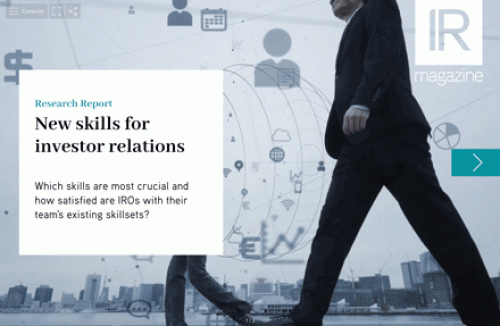Greg Secord, vice president of investor relations at OpenText, says he ‘has always loved the investor relations profession’. His passion is evident when talking to him, and it clearly delivers results: earlier this year, Secord was presented with the lifetime achievement award at the IR Magazine Awards – Canada.
As a former CIRI board member and current NIRI board member, Secord has had a perfect vantage point to see how the profession has changed since he first started out in the role. In this Q&A, he reflects on that and imparts his advice for how aspiring IROs can become subject-matter experts.
How would you summarize your approach to investor relations?
The investor relations community really accepted me with open arms when I came into a more formalized IR role 25 years ago. When I started, OpenText was a small and very entrepreneurial company. The CEO at the time, very early on, took me aside and said I want you to run the IR department like it’s your business – think outside of what everyone else does and try to push for excellence. Those were the marching orders from day one. As the company grew from a couple of hundred employees to several thousand, I tried to keep that spirit. I try to make strategic decisions based on having the autonomy to think outside the box a little bit. In a very regulated industry, I find that very empowering.
As a team and a group, it’s all about being inclusive and collaborative. The team and I are integrated with other groups in the company and we’re learning all the time. We work very closely with legal, treasury, financial planning and communications. This is not only a best practice – we see it as an absolutely paramount part of the job. We set up a learning call once a month with someone from the business so that we’re constantly learning something new.
What advice do you have for people starting out in IR today?
We all want best practices in disclosure and in our relationships with the Street, but when I think about how to add strategic value beyond that, it’s about striving to become a subject-matter expert. That means knowing operations and having an understanding about your industry, and knowing the ecosystem of other companies out there. As an IRO you know you’re getting there when analysts and investors ask your opinion about specifics related to your industry, not just to IR. It’s not something that happens in a year or two. It requires constant programs to learn and be more strategic about your business and your industry.
That’s certainly led to how we run our IR department today. The reality is your CEO and CFO are busy running the company, so the job of IR is to use their time and involvement in the most strategic and impactful way. A really successful IR department has to be super-smart. You simply can’t tie up a CEO and CFO on every investor call.
What do you think has been the biggest change in the IR profession during your career?
When I started in IR 25 years ago, I’m not sure it was a defined profession in the same way it is now. I met a lot of people who were moving into it from other roles or it was something they were going to do as they developed themselves into CFO roles. I think the role was more defined by the needs of the company rather than standardizing what investor relations is.
Now it’s a career decision. I knew very early on it was going to be a career decision for me – I knew this is exactly where I wanted to be. The change I would say is there’s a much higher level of importance on the strategic thinking of the IR department now. We’ve moved beyond being seen as a disclosure gatekeeper into being seen as a proactive, strategic-thinking role.
As IR Magazine builds up to its 30th anniversary issue – the upcoming winter 2018 issue, which will be the 279th edition of the industry’s flagship magazine – we’ll be posting more throwbacks to old covers, revisiting some of the hot topics from the past 30 years of investor relations and hearing from some of the industry titans.










